Latest News
Bringing Health Insurance to AAPI Immigrants in New York
Posted by on May 13, 2014 at 12:50 PM EST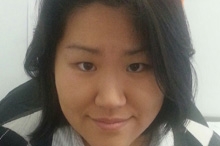
Minja Hong is being honored as a Health in the AAPI Community Champion of Change.
The New York Metropolitan area where my organization serves is often the initial stepping stone for first generation immigrants who choose to make their lives here in the United States. They come here to work, to educate their children, and to create homes. This is no less true of members of the Korean community. Therefore, Korean Community Services’ mission is to support their aspirations through ESL classes, job training, and after-school classes that create culturally and linguistically appropriate social safety nets that make for stronger families and communities.
My role as a Community Health Advocate, and as a state certified Navigator, allows me to understand all the practical challenges of receiving equal access healthcare, even in a diverse city such as ours. When open enrollment started, roughly one out of four individuals in the Korean community, were estimated to be without insurance due to linguistic, cultural, and financial barriers.
As a result, the Navigators at my organization and I, needed to identify and problem solve how we would address concerns specific to the immigrant population when it came to this historical change in our Nation’s healthcare law. Through the support and collaboration with other minority organizations in New York we were able to find much needed answers and apply them while still maintaining full enrollment schedules. In addition, we were compelled to add New Jersey Korean Americans to our roster of clients because of the overwhelming need for language competent services. To accomplish this, my colleagues and I went through another round of training specific to the federal marketplace and traveled to New Jersey sites to provide services throughout the entire open enrollment period. I was also privileged to be able to serve the Japanese community in the region in learning about their options in order to participate more fully in the healthcare reform.
Since our branch office is located in Midtown Manhattan it soon became evident to me that our role as bi-lingual Navigators was not only about exposing the challenges and distinctions in securing equal access healthcare to minority groups, but more about finding a common ground with the entire community. Regardless of race, language, creed or gender, the need to be healthy and to make sure one’s children are healthy was always the same. I am privileged to be able to work with driven and far-seeing colleagues, both in and outside my immediate organization, that continue to persevere in ensuring that people are empowered to make their own healthcare choices through education and changes in policy. My hope, going forward, is that despite the difficulties, or perhaps because of them, we find more common ground in the things that affect us all, such as access to healthcare, so that we can move toward creating healthy and productive communities.
Minja Hong is Program Coordinator of Healthcare Access Services at Korean Community Services of Metropolitan New York
Learn more about Health CareHelping South Asians Get Covered in California
Posted by on May 13, 2014 at 12:41 PM EST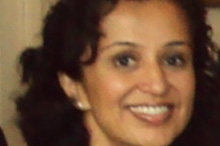
Manju Kulkarni is being honored as a Health in the AAPI Community Champion of Change.
South Asian Network (SAN) is a community-based organization, dedicated to the mission of promoting the health, solidarity and empowerment of South Asian Americans in Southern California. Founded in 1990, SAN is one of the oldest South Asian American community-based organizations in the nation. Our offices are located in the City of Artesia in the heart of “Little India.”
Since 2003, SAN has been working to improve the health of the South Asian community in Southern California. Currently, the Community Health Action Initiative (CHAI) serves the health and health care access needs of South Asian Americans and immigrants in the following ways: (1) outreach and education on the benefits of the Affordable Care Act and enrollment assistance in Covered California, California’s health benefit exchange; (2) outreach and enrollment assistance in other public benefit programs including Medicaid, Medicare, Food Stamps and SSI; (3) patient navigation services; (4) health education on cancer prevention, cardiovascular disease, diabetes, stress management and depression; (5) a caregivers’ support group for those individuals caring for seniors; (6) mental health services for adults, children and seniors; and (7) a seniors’ walking club and nutrition program.
SAN was the only South Asian organization in California to be certified to provide outreach, education and enrollment assistance in the state’s health benefit exchange, Covered California. This allowed our staff to conduct outreach to over 2400 individuals. In addition, SAN received coverage in two national media outlets, the LA Times and PRI’s The World, in one state resource, California Health, as well as several local ethnic media outlets on our work to educate South Asians on the benefits of the Affordable Care Act and assist with enrollment in Covered California.
Our staff and board of directors are most proud of the social justice framework which enables us to envision a more just and equitable world, our efforts to engage in prevention as much as service provision, and our success at incorporating diversity of the South Asian community throughout the organization.
Manjusha Kulkarni is Executive Director of South Asian Network (SAN).
Learn more about Health CareReaching Out to Underserved AAPI Communities in Pima County, Arizona
Posted by on May 13, 2014 at 12:38 PM EST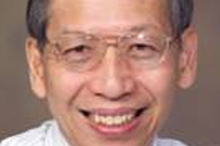
Howard Eng is being honored as a Health in the AAPI Community Champion of Change.
The Pima County AAPI Navigator Program’s primary goal is to reduce the number Asian American and Pacific Islander (AAPI) uninsured in Pima County, Arizona. To accomplish this goal, the program uses both general and specified community cultural, linguistically and appropriate literacy level outreach approaches. The Program works with AAPI community leaders and partners to identify the most appropriate and effective public education and outreach approaches that can be used to reach their communities’ uninsured.
There are many challenges in outreaching to the AAPI populations in Pima County. Some of these include: (1) the AAPI populations are scattered throughout a very large county (larger than New Jersey); (2) many of the AAPI communities are not receptive to outsider interactions; (3) cultural and language barriers; (4) lack of awareness about health coverage availability; (5) limited health literacy; (6) do not see the urgency or the need for health coverage; and (7) even with subsidized coverage with the Health Insurance Marketplace for some AAPI families, it still may not be affordable.
To overcome many of these challenges, the Navigator Program works closely with AAPI community leaders and partners to determine if there is a need for Program assistance to outreach to the uninsured. If there is a need for assistance, the community leaders help to identify the most appropriate and effective public education and outreach approaches that can be used to reached their communities’ uninsured. The program uses cultural, linguistically and appropriate literacy level outreach approaches as well as work within the community culture and structure (e.g., giving public presentations to AAPI community and faith-based groups in English and their preferred language, if needed and providing Marketplace and other health care coverage information booths at AAPI community events). It takes time and patience to overcome the challenges and requires a long term approach in establishing a strong working relationship with the communities.
Looking past open enrollment, from December 2013 to August 2014, the Navigator Program plans to outreach 7 to 8 different Asian American and Pacific Islander communities in Pima County. The Program outreached to the Bhutanese community in December 2013, Marshallese community in January 2014, Filipino and Chinese communities in February-March, and plans to begin outreach to the Asian Indian community in April.
Howard Eng is Assistant Professor and Director of the Southwest Border Rural Health Research Center, Center for Rural Health, The University of Arizona College of Public Health
Learn more about Health CareReaching Rural Hmong Communities
Posted by on May 13, 2014 at 12:36 PM EST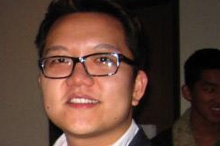
Bruce Thao is being honored as a Health in the AAPI Community Champion of Change.
My family arrived in the United States in December of 1975—greeted by winter in Iowa. Like many other Hmong refugee families, they struggled through poverty, learning a new language, and navigating a maze of systems seemingly built to keep them away from the very services they needed. My parents are proud and resilient and were able to make a better life for us despite having just survived war, refugee camps and leaving all they’ve ever known behind. It is this resilience and indomitable spirit which drives me and my work with Hmong American Partnership (HAP) and its subsidiary, Hmong National Development (HND).
Though the Hmong have come a long way having been in the U.S. for almost 40 years, we still have far to go. In 2010, 1 in 4 Hmong families lived in poverty, which is one of the highest rates across race and ethnic groups in America. In addition, the Hmong community has disproportionately low educational attainment rates and high rates of death from cancer and incidence of other ailments such as Hepatitis B, stroke, diabetes and gout. These health disparities can partly be attributed to a lack of health insurance and not receiving preventative care. By the time they are in front of a doctor they may be in stage 4 of liver or breast cancer.
When the Affordable Care Act passed, HAP and HND knew we had to get information out to our communities, particularly for the growing Hmong communities in Minnesota, California, and the South. While states like California, Minnesota and Wisconsin continue to have the highest Hmong populations (over 200,000 in these three states), we have seen an exponential increase in the Hmong population in the South (now over 20,000 Hmong in southern states). They are located in rural communities that do not have the capacity or infrastructure to provide healthcare outreach or education to the Hmong.
The majority of the Hmong in the South lack health insurance, many had never heard of the Affordable Care Act, and are illiterate in both Hmong and English. So we knew we had a tough task to tackle. In Arkansas, Missouri and North Carolina, HND conducted outreach and created relationships between Hmong community leaders, enrollment agencies and healthcare providers, identifying language assistance and interpreters where available. Through community meetings and conference lines, we connected communities across states and rural areas to educate them. To date we have provided education and outreach to over 500 Hmong farmers and families in the South that otherwise have been unreachable by mainstream agencies.
The keys to our success lie in leveraging community leaders and ethnic media and the power of word of mouth. Our history as a persecuted ethnic minority group has forced us to rely on oral tradition to carry our heritage and our identity. We utilize radio, conference lines, word of mouth and the power of story to get the word out to our communities to know that there are resources available and ways to receive healthcare. Our combined national efforts have resulted in close to 20,000 Hmong and other Southeast Asians learning about the Affordable Care Act and over 2,000 receiving healthcare coverage across the country.
Bruce Thao is Director of Programs for Hmong American Partnership (HAP) and Hmong National Development (HND).
Learn more about Health CareHelping AAPI Immigrants and Refugees in Pennsylvania Get Covered
Posted by on May 13, 2014 at 12:32 PM EST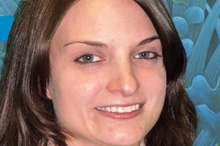
Amy Jones is being honored as a Health in the AAPI Community Champion of Change.
The Affordable Care Act provided a long-awaited opportunity for many Americans to finally get affordable health insurance. With over 50,000 uninsured Asian Americans, Native Hawaiian and Pacific Islanders (AAPI) living in Pennsylvania, 45% of whom lived in Philadelphia, the Affordable Care Act was a turning point for our communities. However, we also anticipated that due to language barriers, low-literacy, confusion about the policy and application process, limited computer skills, and lack of someone who spoke their language to provide in-person enrollment support, many immigrants/refugees would be unaware of the Affordable Care Act and how it would impact them.
In the winter of 2013, SEAMAAC was awarded a grant to engage partner organizations and Asian immigrant/refugee community members around the issue of health care access and health insurance enrollment in Philadelphia. In the spring, we began reaching out to community-based organizations (CBO), faith-based organizations and leaders, local and national advocacy organizations, health care providers, community leaders, small businesses, and physicians, professors, and students from local universities to prepare for the first Open Enrollment Period. Over the summer, we worked with this group to conduct an assessment to gauge the communities’ awareness of the Affordable Care Act, their questions, and their suggestions for outreach, education, and enrollment support. We used a literature review, focus groups, and key informant interviews to conduct this assessment.
The results of this community assessment helped us design appropriate enrollment and community education/outreach strategies. SEAMAAC and partners created outreach and education materials (translated into Chinese, Vietnamese, Laotian, Nepali, Indonesian, Burmese, Karen, and Chin). We worked closely with Nationalities Services Center, to design educational workshops that other CBOs and leaders could use in their communities. From October 2013 to March 2014, SEAMAAC staff conducted 16 Community workshops educating over 700 immigrant/refugee community members. We have educated almost 1,300 community members through general community outreach, and nearly 30,000 through media sources.
In the fall, SEAMAAC became a Certified Application Counselor (CAC) Organization. However, we knew that we could not help enroll everyone by ourselves. In collaboration with Jefferson University and Nationalities Services Center, we conducted a CAC Training for bilingual staff and community leaders ensuring that there were CACs in Philadelphia bilingual in English and Mandarin, Vietnamese, Khmer, Indonesian, Laotian, Hmong, Thai, Nepali, Burmese, Karen, and Chin. SEAMAAC and partners also engaged local Navigator organizations to ensure that they held office hours in immigrant and refugee communities. Throughout Open Enrollment, SEAMAAC CACs and Navigators groups assisted over 450 immigrant/refugee families apply for health insurance through the Marketplace.
Amy Jones is the Director of Health & Social Services for Southeast Asian Mutual Assistance Association Coalition (SEAMAAC), Inc.
Learn more about Health CareCreating Partnerships and Coalitions to Serve a Diverse Community
Posted by on May 13, 2014 at 12:30 PM EST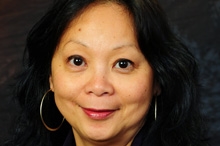
Teresita Batayola is being honored as a Health in the AAPI Community Champion of Change.
Forty one years ago, idealistic community volunteers and student activists came together to create a free clinic for low-income, isolated Chinese and Filipino elderly in Seattle’s Chinatown-International District. As waves of immigrants and refugees sought refuge and a home in the Seattle area, ICHS stepped up to embrace new populations with high-quality, affordable healthcare. That tradition of activism, volunteerism and inclusiveness continues to be vibrant today.
During the movement for health care reform and the passage of the Affordable Care Act, ICHS networked with coalitions around the state to organize, provide patient stories and testimonies, and contact national and state legislators. Once the Affordable Care Act passed, ICHS advocated for Washington State’s adoption of expanded Medicaid and the establishment of the State’s Benefit Exchange through postcard and phone-in campaigns, meetings with elected officials, patient stories, media visibility, and engagement of non-traditional health care partners. However, elation for Washington’s decision to expand Medicaid and create a Health Benefit Exchange was short-lived as ICHS quickly shifted gears to prepare for outreach and enrollment.
ICHS knew that enrolling patients, families and community members into the new programs would be a challenge due to the number of immigrants and refugees who had limited English proficiency, varying immigration status, the mixed eligibility for members in the same family, the lack of understanding about insurance and western health care, and uneven financial abilities to maintain coverage. Nevertheless, the ICHS team of community advocates, health educators, eligibility workers and others began planning outreach and enrollment even with the uncertainty of any funding available. Thankfully, ICHS successfully obtained funding from the federal government and a private foundation to hire 6 In-Person Assisters. ICHS leveraged the funding to obtain training and certification for 25 staffs to provide in-person assistance.
ICHS’ in-person assisters, community advocates, health educators, and eligibility workers worked to actively help anyone learn about health reform and apply for insurance. All of these staff are bilingual and bi-cultural and provide enrollment support in at least one Asian or Pacific Island language, including Cantonese, Khmer, Korean, Mandarin, Punjabi, Samoan, and Vietnamese. ICHS also partnered with community based organizations, faith-based organizations, grocery stores, community centers, and libraries to meet the community need, sending staffs to train others and scheduling field enrollment sessions in addition to appointments in ICHS clinics. An example of a key partnership is with the City of Bellevue’s mini City Hall located in a shopping center. The mini City Hall provided space for the in-person assister and assistance with Russian and Spanish languages, while another partner, Chinese Information and Service Center, provided Chinese interpretation. ICHS staffs remained positive throughout enrollment even when faced with the challenges of appointments longer than an hour due to interpretation and the complexity of individual or family status, combined with the technical challenges of the Exchange.
Teresita Batayola is the Chief Executive Officer of International Community Health Services (ICHS) in Seattle, Washington.
Learn more about Health CareThis Year in the White House: Passover!
Posted by on April 21, 2014 at 11:01 AM ESTThis year, as they have every Passover since coming to the White House, President and Mrs. Obama hosted the annual White House Seder. The tradition dates back to 2008, when the President celebrated Passover with staffers and friends on the campaign trail. After his election the President fulfilled his promise to host the Seder “next year in the White House” if he was elected. This year’s Seder incorporated traditional elements and foods of the Seder, including the Gefilte Fish Matzo Ball Soup, the Hillel Sandwich, and “Dayenu.”
There were several new elements as well. Two chefs who specialize in Jewish cooking—Susan Barocas and Vered Guttman—assisted White House Chef Cris Comerford with the meal and brought new additions to the menu, including a salad of quinoa cooked in coconut milk with Tuscan kale and roasted yams, and chicken with green olives. Underscoring how the Exodus, one of humanity’s great liberation stories, resonates so strongly in the American experience, guests also read the Emancipation Proclamation.
Vered, who writes the “Modern Manna” blog for the English edition of Ha’aretz, wrote about what it was like to be a guest chef for the seder here.
The full menu for this year, prepared by White House Chef Cris Comerford, White House Pastry Chef Bill Yosses, Susan Barocas and Vered Guttman, included:
- Gefilte fish
- Haroset
- Chicken soup with matzoh balls
- Salad of quinoa cooked in coconut milk with Tuscan kale and roasted yams
- Wilted spinach
- Carrot soufflé
- Passover Noodle kugel
- Roasted potatoes with garlic and onion
- Roasted sweet potatoes
- Seared aalmon with roasted artichokes
- Chicken with preserved lemons and green olives
- Braised beef brisket
- Raspberry ganache marjolaine
- Passover brownies
- Passover mandel bread
Matt Nosanchuk is the Director for Outreach on the National Security Council.
Muslim Women Emerging Leaders: Rising Beyond the Ceiling
Posted by on April 18, 2014 at 3:06 PM EST“As we honor the many women who have shaped our history, let us also celebrate those who make progress in our time.” – President Obama, Women's History Month Proclamation 2014
In celebration of Women’s History Month, the Office of Public Engagement organized and hosted a Muslim women emerging leaders event at the White House. The event brought together leading Muslim American women and aspiring young Muslim women to celebrate their aspirations and honor their contributions to our nation to bring progress in our time; hear directly from Administration officials about policies and programs affecting women; and discuss ways to rise beyond the ceiling and become leaders in government, media, business, and STEM (science, technology, engineering, mathematics).
More than 80 women from various states and local universities and high schools participated in the event and had the opportunity to share their experiences and hear from Administration staffers and other leaders in the community.
Key speakers included former Secretary of State Hillary Clinton’s Chief of Staff Huma Abedin, U.S. Special Envoy to the Organization of Islamic Cooperation Rashad Hussain, Deputy Director of the White House Council on Women and Girls Avra Siegel, and outreach liaison to Muslim American communities for the White House Office of Public Engagement Rumana Ahmed, who all shared their perspectives on women—specifically Muslim women—in leadership across sectors and the role of identity. The main panel was moderated by Hoda Elshishtawy of the Muslim Public Affairs Council, who helped organize this leadership event.
During breakout sessions, participants also heard about opportunities and initiatives from White House staff, including Press Secretary for the First Lady Joanna Rosholm, Press Assistant Monica Lee and Senior Policy Advisor for the Office of Science and Technology Policy, Danielle Carnival.
They also heard from other Muslim women in the field, including former CNN executive Maria Ebrahimji, Raheemah Abdulaleem from the Department of Justice, Reema Dodin from the Hill and Founder & CEO of Invest to Innovate, Kalsoom Lakhani.
Opportunity for all, women’s empowerment and leadership, and equality were all issues that brought these women together and what the President has already moved to act on. Read more about President Obama’s actions here.
Rumana Ahmed leads Arab American and Muslim American outreach and is the Executive Assistant to the Director of the Office of Public Engagement.
- &lsaquo previous
- …
- 31
- 32
- 33
- 34
- 35
- 36
- 37
- 38
- 39
- …
- next &rsaquo


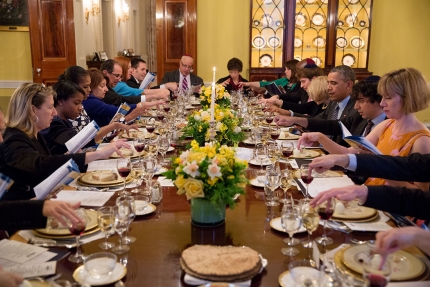
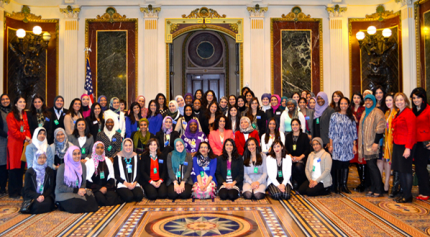
Twitter